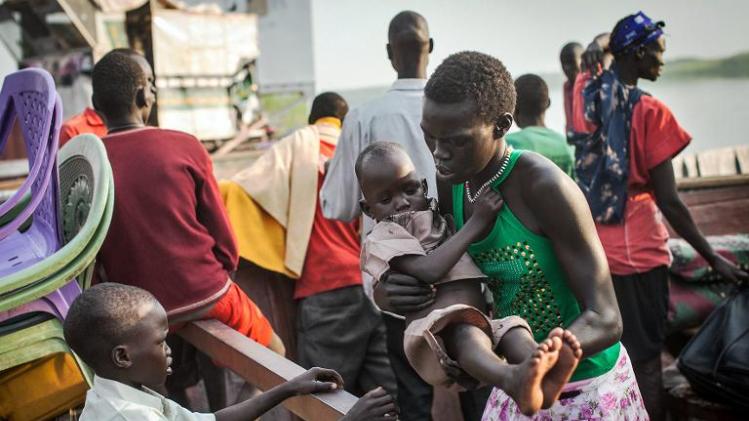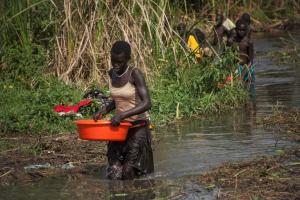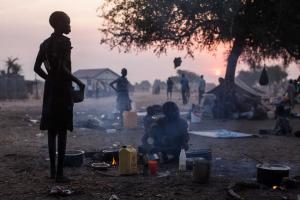US Scrambles to Avert Civil War in South Sudan
Three years after midwifing South Sudan's birth, the United States is desperately trying to prevent the world's youngest nation from falling apart.
Yet despite shared consternation by the Obama administration and Congress, no one is quite sure what the U.S. can do to bring peace to a country that in many ways owes its existence to the United States. The violence has killed more than 1,000 people and driven 180,000 from their homes in the last month, and spread to neighbors killing each other purely on tribal identification, threatening a place that until recently was viewed by Democrats and Republicans alike as an American success story in Africa.
"Each day that the conflict continues, the risk of all-out civil war grows," Linda Thomas-Greenfield, the top U.S. diplomat for Africa, warned Thursday. "There is clear evidence that targeted killings have taken place, with Dinka killing Nuer, and Nuer killing Dinka. Countless civilians, particularly women and children, have become victims."
For the United States, South Sudan's instability isn't just another example of a weak African state struggling to deal with political infighting, endemic poverty and deadly battles between the military and rebel groups. Because of its history as a largely Christian nation that was able to win its freedom from Muslim-dominated Sudan, South Sudan has a powerful constituency in Washington. And the bloodshed is proving an embarrassment to the U.S., which has provided hundreds of millions of dollars in aid to the country and been its strongest international champion.
The crisis began with a political dispute on Dec. 15 as President Salva Kiir, an ethnic Dinka, accused his former vice president, Riek Machar, an ethnic Nuer, of trying to overthrow the government. Machar denies the accusation, accusing the government of rooting out political opponents. Thomas-Greenfield said the U.S. had no evidence of a coup attempt, putting the initial blame on the government for raiding Machar's home.
But the violence has spread significantly since, sparking a series of ethnically motivated attacks and counterattacks while groups allied to Machar have claimed military victories and greater control of territory. Meanwhile, Uganda has sent in hundreds of troops and provided Sudanese government forces with military hardware, and threatened deeper intervention if militants move on the capital, Juba.
Washington has mobilized on two fronts, organizing peace talks between representatives of both sides in Addis Ababa, Ethiopia, and getting the U.N. Security Council last month to approve 5,500 more peacekeepers to South Sudan.
The peace talks have yet to stop the fighting, though Thomas-Greenfield said a cease-fire was all but agreed if Kiir releases 11 high-level political detainees. Help also could also come soon for the 7,600-strong U.N. force in South Sudan, she added, even if only a Bangladeshi police unit has arrived thus far.
"For 30 years the United States has been supporting the people of South Sudan, even before South Sudan became an entity, supporting their right to exist, their right to freedom of religion, and their fight against the government of Sudan," Thomas-Greenfield told the Senate Foreign Relations Committee. "We birthed this nation and there are Americans from all walks of life ... who are concerned about what is happening."
Senators agreed. "This is a place people expect us to make a difference," Sen. Bob Corker, the committee's top Republican said.
Washington has clear security interests at stake. Having seen al-Qaida gain a foothold in several nearby countries over the last couple of years, the U.S. doesn't want to see terrorist groups infiltrate yet another place wracked by internal fighting. And it also is keeping a wary eye on Sudan, which fought for 22 years to hold onto the oil-rich territory and which the United States still considers a state sponsor of terrorism. Its president has suggested joint security patrols with South Sudan's government, which the U.S. has yet to respond to.
While the focus is currently on diplomacy, U.S. officials and congressional aides said the military also has begun studying scenarios under which the United States could consider supporting local partners such as Uganda, Ethiopia or Kenya to move into South Sudan to restore order. They spoke on condition of anonymity because they said they weren't authorized to speak publicly on the matter. Under no scenario are U.S. military boots on the group envisioned in the country.
The United States has some leverage. After helping secure peace with the north in 2005, Washington guided South Sudan through a referendum three years ago to the day approving its independence. Since, the U.S. has intervened to secure a series of agreements with Sudan on sharing oil revenue and managing, if not solving, their border disputes. When South Sudan became its own country in July 2011, President Barack Obama hailed it as a "reminder that after the darkness of war, the light of a new dawn is possible."
But since winning freedom, South Sudan's patchwork of ethnic loyalties and political rivalries has been tearing at the seams. Before even the latest bout of violence, Secretary of State John Kerry and members of Congress warned Kiir this summer to halt a series of ethnically motivated atrocities against minorities or risk losing vital U.S. aid and diplomatic support.
American security funds — representing just a fraction of the $1.8 billion in total assistance that has been approved since 2011 — has dried up. And the White House recently vowed a complete aid cutoff to anyone who seizes power by force. The threat carries greater force than in Egypt, for example, because the United States has been so instrumental in creating and sustaining South Sudan over its short history.
In response to the violence, Thomas-Greenfield said the U.S. was providing an additional $50 million in humanitarian assistance to South Sudan. But with the fighting preventing access to many parts of the country and a dearth of aid workers on the ground to deliver assistance, it is unclear what that commitment will mean in the short-term.
Underscoring the danger, four U.S. Navy SEALS were injured last month when rebel forces fired on three helicopter-airplane Ospreys during an evacuation mission. The U.S. has sharply drawn down its diplomatic presence in South Sudan. The Juba embassy is currently being staffed only by just an ambassador and two aides, Thomas-Greenfield said. They're being protected by nine diplomatic security agents, seven Marines and 45 additional forces.
Despite frustration with Kiir, the U.S. and its African partners still see him as the best of bad options. Kiir is the democratically elected president. His opponents include rebels who've employed child soldiers. Since taking territory, their disruption of oil exports has worsened South Sudan's already miserable economic condition. Kerry called Kiir this week to reiterate his support.
Achieving a sustainable peace is likely going to be messy. Machar won't accept a simple return of the status quo of Kiir's Dinka-dominated government. Yet few want to see Machar returned to the vice presidency after the atrocities his side has committed. Further afield are rebel warlords who may or may not accept any power-arrangement agreed by the top guys.
For now, those issues are secondary.
"We need to start with a cease-fire. These other ethnic troubles are years in the making and can't be solved immediately," said Tom McDonald, a former U.S. ambassador to Zimbabwe who studies Africa issues for the law firm BakerHostetler.
McDonald said the violence shouldn't deter from what America has done for South Sudan. "We helped settle a huge problem. We did the right thing," he said. "But these countries only work if the leaders in these countries make them work."
===============
9 January 2014 Last updated at 12:37 ET
South Sudan's army advances on rebels in Bentiu and Bor

The BBC's Alastair Leithead said rebels destroyed ammunition to stop it falling into government hands
South Sudan's army is advancing against the key rebel-held centres of Bentiu and Bor, as rebels strengthen defences in Bentiu.
An army spokesman was quoted as saying that government troops were "next to Bentiu" and some 15 kilometres from Bor. Reports say hundreds have fled from Bor to escape the fighting.
At least 1,000 people have been killed in fighting since 15 December.
Regionally brokered talks to declare a ceasefire have stalled.
People who escaped the violence told an AFP reporter in the area that men with machine guns shot dead fleeing civilians, and torched entire villages and looted crops.
A cattle herder who swam across a river to escape said he was fortunate to survive.
"They [the attackers] had a machine gun raised up on a sandbank, and they fired and fired and fired as we swam," Gabriel Bol told AFP.

The BBC outlines the background to South Sudan's crisis - in 60 seconds.
"The bullets were hitting the water, but we knew we could not stop or they'd shoot us."
Hundreds of people were fleeing to the town of Minkammen, about 25 kilometres south of Bor.
About 80,000 people had already taken refuge there, AFP reports.
South Sudan rivals battle over key oil region

Juba (AFP) - South Sudanese government forces were on Thursday battling to retake the key rebel-held town of Bentiu, as thousands of civilians continued to flee fighting and peace talks appeared deadlocked.
The fighting has been concentrated in the oil-rich Unity State in the north, and around Bor, capital of eastern Jonglei state, both main rebel strongholds.
Rebel delegates at peace talks held in neighbouring Ethiopia say they will only agree to a truce if the government frees a group of alleged coup plotters detained after the fighting began more than three weeks ago. The government has ruled that out.
Army spokesman Philip Aguer told AFP that troops loyal to President Salva Kiir were now "next to Bentiu", capital of Unity State and one of South Sudan's main oil-producing areas, and that clashes were continuing Thursday.
The UN aid chief in the country, Toby Lanzer, desribed a scene of anarchy inside the town. Shops "have been looted and destroyed", aid agency vehicles were being commandeered by armed gangs and civilians had fled, he said.
A local resident in Bentiu also described an atmosphere of "fear" as civilians braced themselves for an anticipated government onslaught.
Unity State is where much of fledgling oil producer South Sudan's crude is pumped. The country's oil production has dropped by around a fifth since the fighting began, depriving the impoverished nation of a key source of foriegn currency.
The army spokesman said government troops were also locked in combat some 15 kilometres (nine miles) from Bor, situated 200 kilometres (130 miles) north of Juba, the only other major town in rebel hands.
An AFP correspondent in Minkammen, on the other side of the swamps of the crocodile-infested White Nile river from Bor, said hundreds of people are making a perilous journey by boat and on foot to escape the fighting. There were already 80,000 people there -- the single largest concentration of those displaced by the conflict.
Many recounted tales of horror, including civilians mown down with machine guns as they fled, and gunmen torching entire villages and looting crops and livestock.
"They had a machine gun raised up on a sandbank, and they fired and fired and fired as we swam," said Gabriel Bol, a cattle herder. "The bullets were hitting the water, but we knew we could not stop or they'd shoot us."
Peace talks deadlocked
The unrest began on December 15 as a clash between army units loyal to President Kiir and those loyal to ex-vice president Riek Machar. It has escalated into war between government troops and a loose alliance of ethnic militia forces and army units who have defected to the rebel side.
The exact toll of the conflict is unclear. The UN has said well over a thousand people have died, although sources from a number of relief organisations say they believe the number of fatalities is well into the thousands.
The US special envoy to Sudan and South Sudan, Donald Booth, shied from calling situation all-out civil war.
"Let's just call it a conflict right now, lets not escalate it ourselves," he told AFP in Addis Ababa, where the East African regional bloc IGAD has been trying to broker a truce.
"There's always a risk of escalation, that's for sure. That's why it's so important that the cessation of hostilities be the key priority," he added, confirming that the fate of political prisoners "has been a stumbling block" for the peace talks.
South Sudan's government is currently holding 11 of Machar's allies, many of them senior figures and former ministers, and has been under pressure from IGAD -- the East African regional bloc brokering the Addis Ababa talks -- as well as Western diplomats to release them as a goodwill gesture.
The demands have been resisted until now, with the government arguing the detainees should be put on trial for their role in what the president says was an attempted coup.
A further source of tension has been rebel allegations that neighbouring Uganda has been providing crucial military support for the government.
"While IGAD countries are pursuing peaceful solution to the conflict, Uganda military are busy killing our innocent population in Jonglei state," rebel spokesman Hussein Mar Nyuot told reporters in the Ethiopian capital.
He said the rebels were "disappointed" by Juba's refusal to free the prisoners, but said talks would continue.
"I can't say actually that the talks are going to collapse," the spokesman said. "We are still hopeful that there is big pressure on (President) Salva Kiir, and that he might actually change his mind."



No comments:
Post a Comment